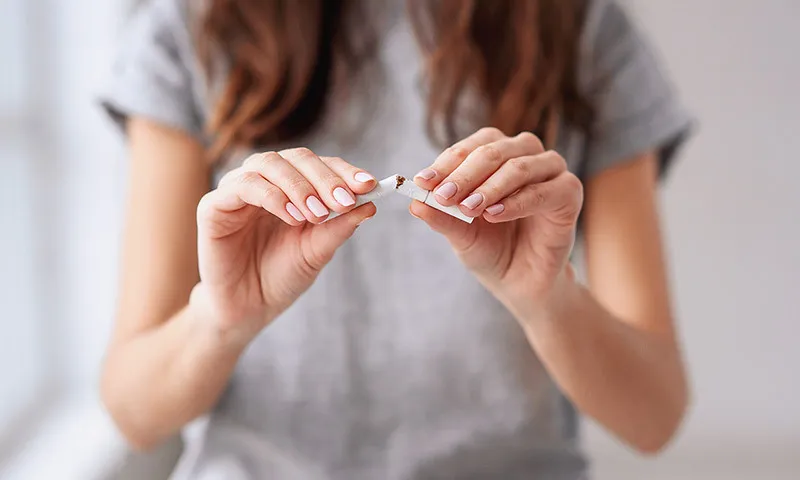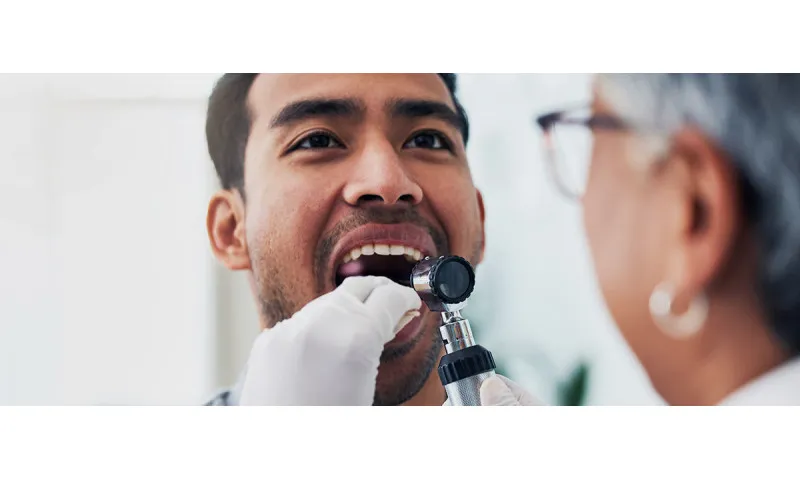Advantages: Why stop smoking?
When you stop smoking, you are doing your body a huge favour. After all, the smoke you let into your mouth and lungs contains almost 5,000 toxic substances, up to 90 of which can be carcinogenic. To boost your motivation to quit smoking, we'll first show you some of the benefits.
Longer life expectancy
You will live longer. On average, non-smokers live ten years longer than smokers. What is particularly worrying is that around half of smokers die prematurely (half of them even before the age of 70) because smoking increases the risk of numerous serious diseases - for example lung cancer, heart disease and strokes. This makes smoking one of the biggest risk factors for early death, alongside a lack of exercise and a poor diet. The good news is that our bodies have enormous regenerative powers. If you stop smoking now, you can still make up for a lot and avoid many diseases. This also applies if you have been smoking for several decades. It's never too late to start again!
Better quality of life
Your life will not only be longer, but also better if you stop smoking. Smokers are more susceptible to infectious diseases and suffer more frequently from sore throats, sinusitis, digestive problems and high blood pressure. The lungs are also severely affected, which can cause the classic smoker's cough as well as shortness of breath and chronic bronchitis.
Many diseases for which smoking is a risk factor also have an enormous impact on your quality of life: for example, breathing difficulties can severely restrict your mobility. Or: a heart attack can leave you with a permanent disability. Some diseases, such as hypothyroidism, can also be managed much better if you stop smoking. There is also a direct link between potency and smoking: men who smoke are twice as likely to suffer from impotence compared to non-smokers. Erection problems often improve again due to the regeneration of the blood vessels when those affected stop smoking.
Many smokers fear that their life without cigarettes will be less enjoyable. However, this is completely wrong: when you stop smoking, you will smell and taste much better because your sense of smell and taste is no longer permanently anaesthetised. This opens up a whole new world of pleasure: you will smell flowers more intensely again and can also enjoy food much more intensely.
Less stress and tension
Does smoking help you to reduce stress? If so, you're not alone. Many smokers believe that there is nothing more relaxing than a cigarette. Unfortunately, this is a fallacy: Nicotine does not reduce stress. On the contrary, nicotine addiction triggers stress if you haven't smoked for a while. If you then give your body the expected dose of nicotine, this tension decreases. So when you stop smoking, you don't lose a means of coping with stress, but a cause of stress.
Your mental state will also improve after a short period of change: According to a study by the Cochrane Foundation, anxiety, depression and stress decrease when you stop smoking.
Lower risk of cancer
Cigarette smoke really packs a punch: it is responsible for up to 90 per cent of cancers in the organs with which it comes into direct contact. In addition to the lungs, this also includes the throat, larynx, oesophagus and the entire oral cavity. Frequent alcohol consumption further increases the risk of cancer. Cigarette smoke also ensures that saliva contains more carcinogenic substances, which - according to the German Dental Association - can cause leukoplakia. These are white spots that are considered a precursor to oral cavity cancer.
There is also good news here: if you stop smoking, you significantly reduce the risk of cancer. After five years without smoking, the risk of cancer in the oral cavity, throat and oesophagus is halved. After ten years, the risk of developing lung cancer also decreases significantly.After 20 years, the risk of oral cavity cancer is at non-smoker level.
Good to know:
Cancer screening is particularly important if you are a smoker. You can find out what you need to look out for and when which appointment is due in our article:
Better appearance and better radiance
Many people are afraid of putting on weight when they stop smoking. But quitting smoking has numerous beauty benefits: you get better skin, fresher breath and dark circles under your eyes can also disappear. Smoking causes your skin to age prematurely - even more so in women than in men. If you stop smoking, you will be doing your skin a big favour and it can finally regain its rosy glow. Your wrinkles won't disappear completely, but you will stop premature skin ageing and look younger and fresher overall.
Unsightly discolouration on fingers and nails also disappears. Your teeth can also shine again - after you have undergone a professional teeth cleaning or, in the case of severe discolouration, additional bleaching - without being directly discoloured again by cigarette smoke. With whiter teeth, better skin and no unpleasant smell of smoke, you will immediately feel much more comfortable and attractive.
Good to know:
Many smokers suffer from yellow teeth because toxic substances such as tar are deposited in the oral cavity during combustion and create a haze over the teeth. You can find out how to whiten yellow teeth in our article:
Better oral health
Cigarette smoke is poison for your oral health: it impairs blood circulation, changes the composition of saliva and dries out the mouth. Scientists at New York University have found in a study that cigarette smoke has a negative impact on the microbiome in the mouth: 150 bacteria were more prevalent in smokers than in non-smokers - including streptococci, which are considered the most important trigger for tooth decay. In contrast, 70 other types of bacteria, some of which are important for the decomposition of toxins, were significantly less common. Cigarette smoke therefore provides the ideal breeding ground for "bad" bacteria.
Smoking is therefore also a risk factor for periodontitis, an inflammation of the periodontium. At an advanced stage, this gum disease leads to open tooth necks, loose teeth due to jawbone recession and even tooth loss. What makes the whole thing particularly insidious for smokers is that the poor blood circulation does not initially lead to gum inflammation with bleeding gums, as is the case with non-smokers, but those affected often do not realise for a long time that there is a need for action. The risk of tooth decay is also significantly higher in smokers. As a result, smokers need fillings, crowns and root canal treatments more frequently and therefore suffer from toothache more often.
In addition to these serious dental diseases, smoking is also responsible for unpleasant side effects: Dry mouth and Bad breath. So if you stop smoking, you will not only have healthier teeth, but also a more pleasant taste in your mouth. In addition, the microbiome also recovers: in the study described above, there was no difference between non-smokers and ex-smokers who had not smoked for at least ten years.
Good to know:
You can find out exactly how periodontitis is treated and how you can recognise it in our article:
Particularly important: quitting smoking during pregnancy
Women are often more motivated to stop smoking during pregnancy - and rightly so. After all, it's not just about their own health, but that of their growing baby. When women smoke during pregnancy, they introduce nicotine into their baby's bloodstream and damage its development: the risk of malformations, infant mortality, premature births and miscarriages is increased. In addition, babies born to mothers who smoke are born with a lower birth weight and have an increased risk of respiratory and cardiovascular diseases. The risk of cancer is also increased.
Incidentally, men should also stop smoking during the fertility phase: The sperm of smokers contains more genetic damage, heavy metals and aggressive oxygen compounds than that of non-smokers. Smoking also has a negative effect on fertility in women. And once the parents-to-be have managed to stop smoking, it is worth persevering: This way, the children can grow up without the dangers of passive smoking.
Good to know:
Did you know that pregnancy can put a lot of strain on your teeth? Find out here what you need to pay particular attention to during this important phase of your life to protect your teeth and your baby:
More money
Last but not least: smoking costs a lot of money. If you save all the money you spend on cigarettes, you can use it to fulfil small and big dreams or invest the money you save wisely. Just for orientation: the average smoker spends around 2,000 euros a year on cigarettes. Of course, you can also extrapolate this figure: After ten years of not smoking, you have already saved 20,000 euros, after 20 years it is already 40,000 euros. Just think what you could do with this money.
What happens to your body when you stop smoking?
Complete detoxification takes time, but the first effects of regeneration are noticeable shortly after the last cigarette. Let's take a look at the benefits after a few minutes, days, weeks and years in a timeline:
- After 20 minutes: Blood pressure drops, pulse normalises and blood circulation improves.
- After 12 hours: Your organs get more oxygen again. This increases your physical performance.
- After 24 hours: The risk of a heart attack already decreases slightly.
- After 2 days: Your sense of smell and taste will recover. You smell and taste better again.
- After 2 weeks to 3 months: The circulation stabilises and lung function improves due to better blood flow.
- After 1 to 9 months: mucus is broken down: the sinuses, airways and lungs are cleared. Coughs, sore throats and shortness of breath become less frequent.
- After 1 year: the heart also recovers. The risk of coronary heart disease is halved.
- After 2 to 5 years: The risk of heart attack drops to the level of non-smokers.
- After 5 to 10 years: The risk of cancer of the oral cavity, pharynx and larynx is halved; the risk of strokes decreases.
- After 10 years: The risk of lung cancer is halved.
- After 15 years: The risk of coronary heart disease is almost at non-smoker level.
Withdrawal symptoms: short-term "Disadvantages"
Although the advantages of quitting smoking far outweigh the disadvantages, you will have to adjust to "side effects" in the short term. Your body has become accustomed to the regular dose of nicotine. If you now stop smoking and the expected dose does not materialise, your body will react with withdrawal symptoms. What sounds very unpleasant is actually a good thing: your body starts to detoxify and regenerate. Now that it doesn't have to constantly fight the toxic substances from cigarette smoke, it has time to cleanse itself. Important to know: There are no disadvantages to quitting smoking. The withdrawal symptoms are only temporary and in no way comparable to the serious illnesses that can await you if you continue to smoke.
What symptoms can you expect when you stop smoking?
First things first: withdrawal symptoms can occur, but they don't necessarily have to. Many smokers imagine the symptoms to be much worse than they actually are. Some people even experience only very mild withdrawal symptoms. The severity of withdrawal symptoms varies greatly from person to person.
The following symptoms may occur:
- Strong craving for a cigarette
- Irritability and aggressiveness
- Bad mood
- Nervousness/restlessness
- Headache
- Tiredness and fatigue
- Sleep disorders
- Big appetite/hot appetite
- Sweating
- Diarrhoea
Quit smoking: How long does it take?
Most smokers are addicted to nicotine. This addiction has both a psychological and a physical component. The physical withdrawal symptoms are overcome relatively quickly: The symptoms usually only last about a week. They are at their most intense on the third day, after which they subside. After three to four weeks at the latest, the body has overcome the nicotine addiction.
The situation is somewhat different for the psyche. Even if the body is no longer addicted to nicotine, the psychological craving for a cigarette can persist - sometimes for years. The good news is that the urge to smoke only occurs occasionally and only lasts for a few minutes at a time. In these situations of temptation, distraction helps.
Quitting smoking and gaining weight
Women in particular fear that they will gain weight when they stop smoking. In fact, around 60 per cent of former smokers initially gain 2.5 to 4 kilograms. One reason for this is that nicotine has an effect on the metabolism. People who smoke burn around 200 calories more per day than non-smokers because their body has to fight the toxins. On the other hand, not smoking revives the previously permanently numbed sense of smell and taste. Food simply tastes better and many ex-smokers eat more. In addition, cravings and a strong appetite are part of the withdrawal symptoms. If you then eat a chocolate bar as a distraction instead of taking a drag, it's no wonder that a few kilos accumulate on your hips. The 200 extra kilocalories can quickly add up to 400 kilocalories - for example with two chocolate bars.
However, this doesn't have to be the case. If you know the reasons for your weight gain and don't fall into the trap of replacing smoking with snacking, you can quit smoking without gaining weight - especially if you do more exercise.The additional 200 calories per day can be burned off relatively easily through exercise - for example, a 30-minute walk This is not only good for preventing weight gain, but also helps you to keep it off. People who exercise have fewer cravings for cigarettes while they are quitting. If you incorporate a little more exercise into your daily routine, you can even stop smoking and lose weight at the same time!
Good to know:
Quitting smoking now is an opportunity to make your life healthier overall! You can find great ideas for healthy snacks here:
Quit smoking: 11 tips for successfully quitting smoking
Have you decided that you want to stop smoking? Congratulations! That's a great decision. To support you, we have summarised the 13 most important tips and tricks:
1. Set a clear goal for motivation
Why do you want to stop smoking? The more precisely you can answer this question, the more motivated you will be to persevere. It's best to write down what specifically motivates you. "Smoking is unhealthy" is often not enough motivation. Much better is: "I want to be fit enough to play with my grandchildren." or "I don't want to die of cancer at 70." or "I don't want to be ashamed of my yellow teeth and the smell of cigarettes when I meet non-smokers." or "I want my baby to develop healthily."
It is particularly helpful to visualise clearly what could happen if you continue to smoke as you do now. How would a cancer diagnosis or a heart attack change your life? Colour in this horror scenario in great detail so that you have the strongest possible motivation to change something. Now think in just as much detail about what your life would be like as a non-smoker: Imagine exactly what it will be like when you have made it. Feel free to dream big. For example: you would actually like to do more for your health and go jogging, but you are out of breath after just a few steps due to smoking. Now visualise yourself running your first marathon.
2. Set a date and go through with it
Are you still wondering whether you should quit smoking slowly or quickly? The answer is clear: quickly! Experience has shown that quitting cold turkey works much better than quitting slowly. Once you have made the decision to stop smoking, you should get straight down to business if possible. Choose a date and go through with it. No one has ever become a non-smoker from the vague decision "I should stop smoking". Much better is: "12 May is my last day of smoking. From 13 May it's over!"
As you can see, you don't have to quit smoking overnight. It's perfectly okay to choose a date in three weeks' time so that you can mentally adjust to the change and make preparations. However, the date should be within the next few weeks. If you don't want to quit for six months or even a year, your motivation will probably be long gone by the time the chosen day arrives. If possible, choose a quiet time in your life to start quitting smoking.
3. Make the environment "smoke-free"
Out of sight, out of mind: If you don't have any cigarettes at home, you will be much less tempted than if you have an "emergency pack" hidden in a drawer. Throw away everything that has to do with smoking or give it away to smokers in your neighbourhood: opened cigarette packets, ashtrays and lighters. If you crave a cigarette late at night but have to leave the cosy sofa to have one, comfort may win out and you'll be able to cope with the withdrawal.
4. Be prepared for withdrawal symptoms and inform your environment
Realise that the first few days of quitting smoking will probably not be a walk in the park. You already know that things like aggression, bad moods and nervousness may be on the agenda. This is naturally unpleasant for you - but also for those around you. That's why it's important that you let friends, work colleagues and family members know that you want to stop smoking. This will make them more understanding of your possible mood swings. The last thing you need in the first few days after quitting smoking is a relationship crisis or family drama.
If you have smokers in your family or circle of friends, they will also have to get used to the fact that you no longer smoke. Ask smokers not to offer you cigarettes and politely but firmly decline the offer if they do. For the time being, it also makes sense to avoid places where you used to smoke and look for alternatives instead.
5. Plan substitute satisfactions and distractions
Especially in the first few days, many new non-smokers experience a strong craving for a cigarette. In order not to become weak, you should think about substitute gratifications and distractions before you quit smoking. The good thing is that the strong desire to smoke only lasts for a few minutes and then disappears again. Important: The substitute satisfaction should not be harmful to your health. Anyone who drinks alcohol or eats a lot of sweets instead of smoking is not doing their body a great favour.
Here are a few ideas on how to survive the craving for a cigarette during the working day smoke-free:
- Nibble on raw vegetables (for example carrot or apple slices)
- Chew gum
- Walk round the block or climb the stairs
- Drink coffee, tea or water
- Take ten deep breaths
- Tug on a rubber band on the wrist
- Squeeze a stress ball
If you are overcome by cravings in your free time, there are of course even more distraction manoeuvres available to you:
- Call a loved one for a chat
- Go for a walk
- Exercise (for example jogging or doing a few push-ups or squats)
- Play a game on your mobile phone
- Practise creative hobbies - for example crocheting, knitting or painting
- Cook or bake something delicious
- Shower or bath
- Do breathing or relaxation exercises
It's best to think in advance about the situations in which you usually smoke and plan a concrete alternative to cigarettes. For example: If alcohol and cigarettes go hand in hand for you, you might want to avoid alcohol for the first few days and plan a cosy movie or game night at home for the weekend instead. If you normally take a morning smoking break with your colleagues, you can also simply inform them that you are quitting smoking and would rather not be tempted.
6. Become active
Sport is the ideal substitute for smoking: When we exercise, our body releases happiness hormones that are similar to those released when we smoke. Although the reward is not as immediate as with smoking, it is much more lasting and healthier. Scientific studies have shown that exercise is an excellent aid to quitting smoking: people who exercise have fewer cravings for cigarettes and weaker withdrawal symptoms. You don't have to spend hours sweating it out in the gym: Just a ten-minute brisk walk in the fresh air reduces the desire to smoke.
Which sport is best? It all depends on what you like. After all, it should also be fun. Endurance sports in the fresh air are always a good idea - whether it's jogging, walking, cycling or swimming. Quitting smoking is also a good opportunity to reactivate old hobbies such as football. In a sporting club environment, you will certainly also quickly make contacts with non-smokers, which can be very positive if your environment consists mainly of smokers. Or how about an entertaining beginner's sport such as aqua aerobics?
7. Incorporate relaxation into everyday life
Most smokers immediately reach for a fag when they feel stressed. Now that you want to give up smoking, you need to find a different way of coping with stress. That's why it's important that you learn to relax without cigarettes. Effective methods include progressive muscle relaxation according to Jacobson, autogenic training or meditation. Many health insurance companies offer online courses in which these relaxation techniques are taught. You can also find such a course at an adult education centre. If this is too time-consuming for you, you can also find numerous videos with relaxation exercises on the internet - for example on YouTube. Try out what works for you. It's best to choose at least two exercises that you can do in your everyday life without instructions: an inconspicuous exercise for everyday work that you can do while sitting down, and a longer exercise that you can do at home while lying down.
Create additional islands of relaxation in your everyday life. This could be a nice walk in the woods, a visit to the sauna, a hot bath with essential oils or quality time with loved ones.
8. Take advantage of offers of help
If you want to quit smoking, you don't have to struggle alone! The Federal Centre for Health Education offers an online quit programme that supports you over a period of 31 days. In addition, a success statistic provides motivation with a display of smoke-free days and cigarettes not smoked. In the forum of the community area, you can exchange ideas with other ex-smokers and motivate each other. Many health insurance companies also offer online courses for support, where you can also exchange ideas with other participants. In fact, you are more likely to succeed in quitting smoking if you have a common goal with others. This works most effectively in on-site smoking cessation courses.
There is also a wide range of apps for quitting smoking. Don't know where to start? Then you can also seek advice from your family doctor. Your doctor can also prescribe you an app on prescription. Your GP can also give you prescription medication in the form of tablets to help you stop smoking. Some medical practices also offer a so-called "non-smoking injection", which is intended to alleviate the physical withdrawal symptoms and is injected at various acupuncture points behind the ear. Please note, however, that the effect of the injection has not yet been proven - the same applies to hypnosis and globules.
Good to know:
The smoke-free hotline of the German Federal Centre for Health Education (01805 31 31 31) is there for you every day: Monday to Thursday: from 10 am to 10 pm and Friday to Sunday: 10 am to 6 pm. In Switzerland, you can call the stop smoking line (0848 000 181) from Monday to Friday from 11 am to 7 pm.
9. Rewarding non-smoking
Have you already worked out how much money you will save if you stop smoking? Then you can reward yourself and fulfil a wish. It is also particularly motivating if you collect the money you would otherwise spend on cigarettes in a separate place - be it a piggy bank, envelope, glass jar or separate account. You are welcome to think about what you want to buy before you stop smoking and when the savings can be plundered. The Federal Centre for Health Education also offers a savings calculator on its website, which you can use to calculate how much money you will save if you stop smoking.
10. Use nicotine replacement products if necessary
If you suffer from severe physical withdrawal symptoms, you can use aids from the pharmacy to help you stop smoking. Patches, chewing gum, inhalers, sprays or lozenges from nicorette, for example, can give your body the usual dose of nicotine - while you remain smoke-free. Over time, the nicotine dose is reduced further and further until you are completely nicotine-free. If you feel a strong craving for a cigarette despite the nicotine patch, you can also use another nicotine replacement product. This increases the likelihood that you will be able to quit smoking permanently.
If you're wondering which e-cigarette is best for quitting smoking, we're sorry to disappoint you: E-cigarettes are not suitable for quitting smoking. Although they are slightly less harmful, they are still very unhealthy. Instead of an e-cigarette, you should use nicotine replacement products if necessary.
Good to know:
Chewing gum is a good distraction when you have a craving to smoke - even if it doesn't contain nicotine. The 'Black is white' chewing gum from Curaprox not only tastes deliciously minty and limey, but also provides a gentle whitening effect with activated charcoal.
11. Don't give up after a relapse
Did you have a weak moment and reach for a cigarette again? That can happen. Most smokers need more than one attempt to quit smoking completely. Now it's important that you don't lose motivation and fall back into your old smoking patterns. If you have picked up a cigarette again in a stressful everyday situation or at a party, this is a clear sign that you need a better replacement strategy for this situation. Think about how you can either avoid the situation completely or solve it better so that you can get through it smoke-free next time.
Good to know:
Your teeth will be happy to know that your mouth will soon be a much healthier environment. But do you actually know how to brush your teeth properly? You can find the most efficient tooth brushing technique here:
Sources
Assadi, Shayan: Immunological and microbiological parameters in the sulcus fluid of patients with chronic periodontitis: influence of smoking, on: db-thueringen.de.
Arbeitsgemeinschaft der Wissenschaftlichen Medizinischen Fachgesellschaften e.V.: S3 guideline "Smoking and tobacco dependence: screening, diagnosis and treatment".
Federal Office of Public Health: Smokers lose time and quality of life.
German Dental Association and German Cancer Research Centre, Heidelberg: Smoking and oral health.
Federal Centre for Health Education: Everyday check, Quitting, Appearance, The smoke-free quit programme, Dealing with others, Changing attitudes, Frequently asked questions about quitting smoking, Help with withdrawal symptoms, Yes, I'm going smoke-free!, Smoking threatens your potency, Tips for craving attacks, on: rauchfrei-info.de
Cochrane Germany: Not smoking can make you happy! Cochrane Review shows that quitting smoking is associated with better mental health.
Cochrane Library: Smoking cessation to improve mental health.
Dani, John A.: Nicotine Withdrawal, in: Curr Top Behav Neurosci. 2015.
Deutsche Herzstiftung: Quit smoking at last? How to do it! and Quit smoking: Medication and how it works.
German Cancer Research Centre, Heidelberg: Facts about smoking.
German Stroke Aid: Smokers die more often from cardiovascular diseases than from cancer.
Hillenbrand, Larissa: Smoke-free injection - Non-smoker with just one prick?
Lung League: It pays to stop smoking.
Nichtraucherhelden.de: Quitting smoking and skin - How does it regenerate after quitting smoking?
Nicolay, Nils et al: Streptococcus mutans, at: flexikon.doccheck.com
NDR: Quit smoking: It can work with these tips.
Parrott, A. et al: Does cigarette smoking cause stress?
Rauchfrei.at: Withdrawal symptoms. Can be, but don't have to be!
Riedel, Anke et al.: How smoking changes your mouth, on: quarks.de.
Schwendicke, Falk et al: Global smoking-attributable burden of periodontal disease in 186 countries in the year 2015, in Wiley Journal of Clinical Periodontology. 2017.
Simon, Claus Peter: Quitting smoking significantly increases life expectancy - even in middle age, on: geo.de.
Swientek, Jana: Quit smoking - 10 tips for smoking cessation, on: praktischarzt.de.
University of Innsbruck: Fast walking supports smoking cessation.
Werse, Bernd et al: Quitting smoking - methods, aids, obstacles. Results of the RauS study, at: uni-frankfurt.de.
Wu, Jing et al: Cigarette smoking and the oral microbiome in a large study of American adults, in The ISME Journal. 2016.
Zerbst, Lilly: Study: Exercise helps to stop smoking, on: swr.de.
All websites last accessed on 02/04/2024.
 Swiss premium oral care
Swiss premium oral care









